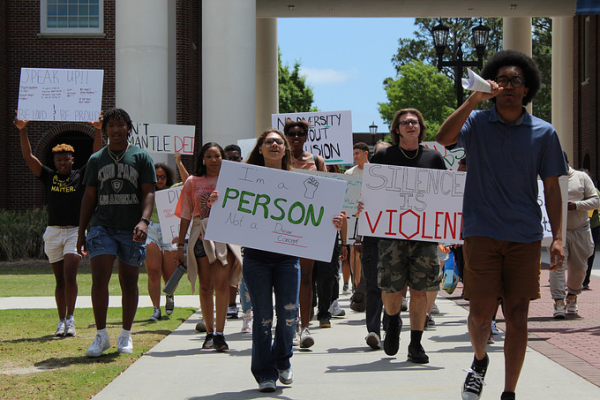Intercollegiate Athletic Review Committee recommends big changes for Seahawks
May 19, 2013
On May 15 the Intercollegiate Athletic Review Committee released its recommendation to Chancellor Gary Miller to eliminate five programs from the athletic portfolio-men’s indoor track, men’s cross country, softball, and men’s and women’s swimming and diving.
Chancellor Miller and UNC Wilmington Athletic Director, Jimmy Bass, will make a decision based on this recommendation in the coming weeks.
In February of 2013 Chancellor Miller tasked the committee with addressing a serious budget crisis facing the UNC Wilmington athletics department.
“The work of the committee is to examine the sustainability and vitality of each of our 19 sports programs with strategic initiatives, fiscal capability, community support and national competitiveness,” Chancellor Miller said in a memo to committee members.
The unanimous recommendation was a reduction to the size of the athletic portfolio in order to meet the athletic department’s fiscal goals.
“If UNCW is determined to meet Chancellor Miller’s goal of competing with national prominence while at the same time restoring fiscal responsibility, UNCW must act now,” said Dr. Terry Curran, Chairperson for the IARC, in a statement posted on the committee webpage.
The 18-page document lays out some very stark numbers:
Department of Athletics’ operating expenses have consistently exceeded revenue and the reserve fund has experienced an 82 percent decrease since 2009. In addition, the Seahawk Club has only raised $460 thousand as of May 1, 2013-not even half of the $1.047 million budgeted target.
The loss of out-of-state tuition waivers due to budget cuts by state legislators, loss of revenue from postseason success in men’s basketball and decreased tickets sales in revenue sports have also added to the financial struggles of the program.
The recommendations represent close to $900 thousand in cut costs and a loss of 117 student- athletes.
According to the committee, the university should also, “honor all scholarship commitments to current student-athletes through graduation, provided the student-athlete remains in good standing (as defined by the NCAA and UNCW) and makes satisfactory progress toward a degree per NCAA eligibility regulations,” in addition to the recommended portfolio decrease.
“While these recommendations will surely invite disappointment and debate, inaction was not an option” said Curran.
However, the report addressed more than just lack of sustainable revenue.
Many athletes have said that the current strength and conditioning program, staff size and the level of travel accommodations compared to other schools affects the overall performance and competitiveness of UNCW to become nationally prominent-one of the sighted goals of the IARC.
The committee also addressed the concerns of recruitment efforts by the coaches.
“The lack of availability of scholarships for most teams was a consistent theme. The loss of tuition waivers for out-of-state student-athletes was a specific item of concern,” said the report, addressing concerns of recruitment efforts by the coaches.
Aside from the scholarship concerns was “the aging facilities, some of which haven’t been updated in over 30 years” and the need to expand and renovate these facilities in an effort to enhance comprehensive recruiting.
The recommendation is in part due to a decade of issues that, according to the committee, stemmed from “a lack of continuity, inconsistent leadership, and a patchwork of short-sighted internal decision-making [that] have created a number of vulnerabilities.”
No matter the outcome, UNCW athletics will undergo significant changes in the future.














